
The Cabinet of Ministers of Venezuela (Spanish: Gabinete de Ministros de Venezuela is one of the bodies that make up the Venezuelan executive in that country's presidential system, alongside the Council of Ministers. The Cabinet is headed by the president of Venezuela, and his corresponding vice president. The purpose of the ministries is to create, adopt, follow and evaluate policies, strategies, programs and projects in accordance with the constitution and the laws of the republic.
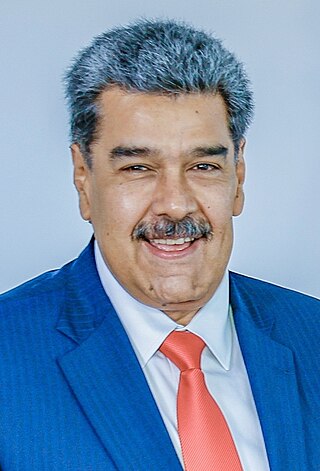
Nicolás Maduro Moros is a Venezuelan politician who has served as the 53rd president of Venezuela since 2013. Previously, he was the 24th vice president of Venezuela from 2012 to 2013, the minister of foreign affairs from 2006 to 2012, and the 3rd president of the National Assembly of Venezuela from 2005 to 2006.

The United Socialist Party of Venezuela is a socialist political party which has been the ruling party of Venezuela since 2007. It was formed from a merger of some of the political and social forces that support the Bolivarian Revolution led by President Hugo Chávez.

Jorge Jesús Rodríguez Gómez is a Venezuelan politician and psychiatrist serving as President of the National Assembly of Venezuela since 2021. He previously served as the vice president of Venezuela from 2007 to 2008 and as Mayor of the Libertador Bolivarian Municipality from 2009 to 2017. He is the brother of Delcy Rodríguez, the current vice president.

Iran–Venezuela relations have strengthened substantially in recent years. "Iran and Venezuela are two friendly and united states which pave their ways to further progress and welfare for their nations", according to President Rouhani. The two countries are contemporary strategic allies of the Russian Federation and the People's Republic of China while opposing U.S. hegemony in their respective regions.

Relations between Cuba and Venezuela were established in 1902. The relationship deteriorated in the 1960s and Venezuela broke relations in late 1961 following the Betancourt Doctrine policy of not having ties with governments that had come to power by non-electoral means. A destabilizing factor was the Cuban support for the antigovernment guerrilla force that operates in remote rural areas. Relations were reestablished in 1974.

Colombia–Venezuela relations refers to the diplomatic relations between the South American neighboring countries of Colombia and Venezuela. The relationship has developed since the early 16th century, when Spanish colonizers created the Province of Santa Marta and the Province of New Andalucia. The countries share a history of achieving their independence under Simón Bolívar and becoming one nation—the Gran Colombia—which dissolved in the 19th century. Since then, the overall relationship between the two countries has oscillated between cooperation and bilateral struggle.

Antonio José Ledezma Díaz is a Venezuelan lawyer, opposition politician and former political prisoner. After unsuccessfully challenging for the leadership of Democratic Action in 1999, he founded a new party, the Fearless People's Alliance.
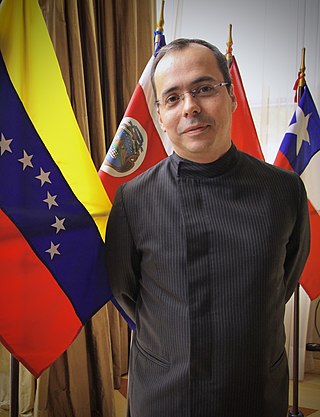
Juan José Rendón Delgado, known professionally as J. J. Rendón, is a Venezuelan political consultant, psychologist, and political activist, known for being the one who has directed and won the most electoral campaigns. He specializes in crisis resolution and is a human rights activist. He is a political asylee in the United States.

The nations of Mexico and Venezuela established diplomatic relations in 1831, however, diplomatic relations between both nations have been historically unstable on several occasions. During the Venezuelan presidential crisis, Mexico took a neutral position and has continued to maintain diplomatic relations with the government of President Nicolás Maduro.

Jorge Alberto Arreaza Montserrat is a Venezuelan politician who has held several important positions in the administration of President Hugo Chávez and his successor Nicolás Maduro. From August 2017 to August 2021, Arreaza served as Venezuela's Minister of Foreign Affairs. Arreaza has been sanctioned by Canada and the United States for his role in the violation of human rights in Venezuela.

Aporrea is a Venezuelan website that publishes news and opinions from the point of view of supporters of former President Hugo Chávez and the Bolivarian Revolution. It ranks as the fourth most visited local political site in the country, according to site metrics Alexa.com, and it claims to be the first among local independent left-leaning outlets. Most of the site's content was supportive of the political changes promoted by late president Hugo Chávez, but in recent years, it has content critical of the current government led by Chavez's protégé Nicolás Maduro, turning it into a "gathering place for dissidence within chavismo".
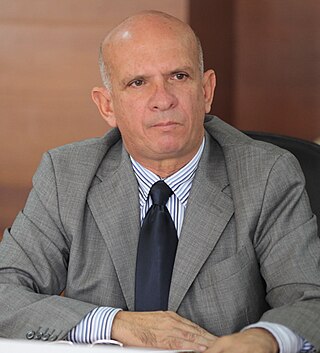
Hugo Armando Carvajal Barrios, nicknamed El Pollo, is a Venezuelan diplomat and retired general. He was the head of the military intelligence in Venezuela during Hugo Chávez's government, from July 2004 to December 2011. Carvajal was arrested in Spain on 12 April 2019 based on an arrest warrant from the United States for 2011 drug trafficking charges; the U.S. asked Spain to extradite Carvajal. After the Spanish courts approved his extradition to the United States Carvajal went into hiding. On 26 March 2020, the U.S. Department of State offered $10 million for information to bring him to justice in relation to drug trafficking and narco-terrorism. On 9 September 2021 he was arrested by Spanish police in an apartment in Madrid. On 19 July 2023, Carjaval was extradited to the United States.

Delcy Eloína Rodríguez Gómez is a Venezuelan lawyer, diplomat, and politician who has served as the vice president of Venezuela since 2018. Rodríguez has held several positions during the presidencies of Hugo Chávez and Nicolás Maduro. She was Minister of Popular Power for Communication and Information of Venezuela from 2013 to 2014, Minister of Foreign Affairs from 2014 to 2017 and President of the Constituent Assembly of Venezuela from 4 August 2017 to 14 June 2018 until her retirement from that office to assume the vice presidency of the country. Since 2024 she holds the position of Minister of Petroleum. She is a member of the national leadership of the United Socialist Party of Venezuela. The European Union, the United States and Canada have placed sanctions on her for what they said were human rights violations and her role in the political crisis in the country.

The Mother of All Marches, also known as the Mother of All Protests, was a day of protests held on April 19, 2017, in Venezuela against the Chavista government of president Nicolás Maduro. The protests began after the Supreme Tribunal of Justice dissolved the National Assembly and took over its legislative powers March 29, 2017 in what was called a self-coup. The dissolution of the National Assembly was reversed shortly thereafter on April 1, 2017.
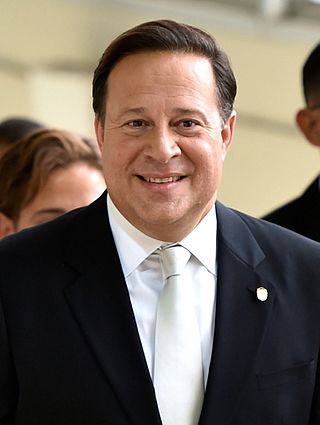
The 2018 Panama–Venezuela diplomatic crisis was a diplomatic stand-off between Panama and Venezuela after the Panamanian government imposed sanctions on President Nicolás Maduro and several key officials of the Bolivarian government over alleged involvement with "money laundering, financing of terrorism and financing the proliferation of weapons of mass destruction" on 29 March 2018.
The negotiations during the crisis in Venezuela are the negotiation and dialogue attempts and processes between the government of Nicolás Maduro and the Venezuelan opposition. Although numerous dialogue processes and roundtables have taken place, by 2023 none had been effective in achieving a solution to the country's crisis.
Ricardo José Menéndez Prieto is a Venezuelan geographer, professor and politician. He currently serves as the vice president of the Council of Ministers of Planning and Minister of the Popular Power for Planning of the Venezuelan government.

William Ernesto Izarra Caldera was a Venezuelan diplomat, military official, and politician.
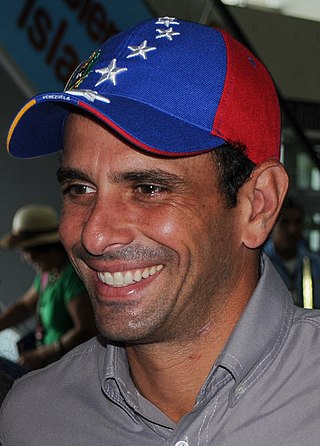
Venezuelan opposition to the Chavista governments of former President Hugo Chávez and current President Nicolás Maduro, commonly referred to as the Venezuelan opposition, or sometimes, anti-Chavismo, is a political umbrella term used to describe political, social and religious movements that have opposed Chavismo, and the associated Bolivarian Revolution political process since 2 February 1999.


















